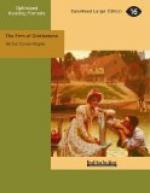“Moscow, August 22.—It is reported from Tobolsk that an important discovery of diamond fields has been made amongst the spurs of the Ural Mountains, at a point not very far from that city. They are said to have been found by an English geologist, who has exhibited many magnificent gems in proof of his assertion. These stones have been examined at Tobolsk, and are pronounced to be equal, if not superior, in quality to any found elsewhere. A company has been already formed for the purpose of purchasing the land and working the mines.”
Some days afterwards there came a Reuter’s telegram giving fuller details. “With regard to the diamond fields near Tobolsk,” it said, “there is every reason to believe that they are of great, and possibly unsurpassed, wealth. There is no question now as to their authenticity, since their discoverer proves to be an English gentleman of high character, and his story is corroborated by villagers from this district who have dug up stones for themselves. The Government contemplate buying out the company and taking over the mines, which might be profitably worked by the forced labour of political prisoners on a system similar to that adopted in the salt mines of Siberia. The discovery is universally regarded as one which has materially increased the internal resources of the country, and there is some talk of the presentation of a substantial testimonial to the energetic and scientific traveller to whom it is due.”
Within a week or ten days of the receipt of these telegrams in London there came letters from the Russian correspondents of the various journals giving fuller details upon a subject of so much general interest. The Times directed attention to the matter in a leader.
“It appears,” remarked the great paper, “that a most important addition has been made to the mineral wealth of the Russian Empire. The silver mines of Siberia and the petroleum wells of the Caucasus are to be outrivalled by the new diamond fields of the Ural Mountains. For untold thousands of years these precious fragments of crystallized carbon have been lying unheeded among the gloomy gorges waiting for the hand of man to pick them out. It has fallen to the lot of one of our countrymen to point out to the Russian nation the great wealth which lay untouched and unsuspected in the heart of their realm. The story is a romantic one. It appears that a Mr. Langworthy, a wealthy English gentleman of good extraction, had, in the course of his travels in Russia, continued his journey as far as the great mountain barrier which separates Europe from Asia. Being fond of sport, he was wandering in search of game down one of the Ural valleys, when his attention was attracted by the thick gravel, which was piled up along the track of a dried-up water-course. The appearance and situation of this gravel reminded him forcibly of the South African diamond fields, and so strong was the impression that he at once laid down his gun




